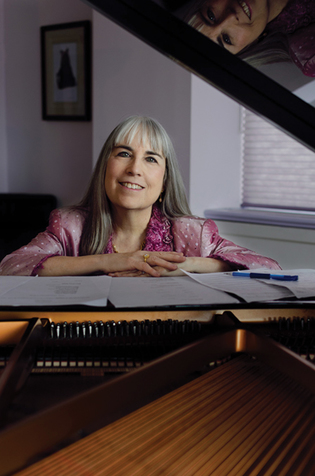
Brittany Florenz
Lori Laitman ’75, ’76MusM, finds music in the words. A composer of vocal and theatrical music, she says a class at Yale trained her in writing music that responds to moods in other media. Her work includes more than 350 songs and several operas.
View full image
“Always have something a little quirky” says composer Lori Laitman ’75, ’76MusM, attributing this lesson to her first composition teacher, at Yale. A composer of vocal and theatrical music, Laitman’s catalogue includes over 350 songs and several operas. Her stage works range from fantastical children’s fairy tales to a lesbian abortion drama adapted from Leah Lax’s memoir, Uncovered. Interviewer brin solomon ’14 recently spoke with her about music, politics, and what makes a poem good to set to music.
brin solomon: Plenty of composers have written a song here or there, but you write vocal music almost exclusively. Did you always know you wanted to do that?
Lori Laitman: It was an accidental discovery, actually. I started studying composition my sophomore year at Yale, mainly because all my friends were composers and I felt left out. I took a class taught by Frank Lewin on writing for film and theater, and that trained me in writing music that responds to moods in other media. I then had a friend who sang, Lauren Wagner, who wanted me to write songs for her, and that’s when I wrote my first art song and discovered that this was better than anything else I’d ever written. I never stopped writing songs after that; it was an instantaneous discovery.
bs: I know for many subsequent songs, you’ve chosen a poet or pre-existing words to set to music. What draws you to a text and makes you want to set it?
LL: I have to feel that I understand it. Because the delivery is going to be aural, it has to be something people can get by listening. If it’s too complicated, it may be a great poem, but it’s not a good fit for music. If there’s a story, that’s also very helpful.
bs: Your music certainly uses melody and harmony in an emphatically narrative way. Did you ever get pushback on that kind of emotional transparency?
LL: Well, I did have good teachers who let me do what I wanted, but most of the music being written in the 1970s was more angular. When someone said, “She writes beautiful music,” it wasn’t exactly a compliment. I was different. I don’t like theory. I’ll say it plainly! In the ’70s, a lot of pieces were very academically driven. There’s more beauty allowed these days, or what seems to be beautiful to my ear, anyway.
bs: You’ve written a number of pieces that set texts by victims and survivors of the Holocaust. I’m curious what’s drawn you to that emotionally heavy work.
LL: That was another case where one thing led to another. I met Mina Miller of the Music of Remembrance project nearly 30 years ago, and she’s commissioned a number of works from me. But it’s also been more personal: I met a survivor once who had a letter from his mother that I set as a gift for him. I’m drawn to examine different aspects of the experience, to explore how it affects the subsequent generation, my generation. Now, more than ever, I think it’s critical to tell these stories.
bs: Have you met any other survivors?
LL: Yes, actually. One of the most amazing things that happened to me was writing Vedem, an oratorio based on a secret magazine that circulated among children in one of the concentration camps. For the premiere in 2010, Mina tracked down the survivors—there were six survivors still alive, then, all around the world, and we managed to get four of them to come to the premiere. I had set six poems that these boys had written for the magazine alongside a libretto by David Mason telling an imagined story about how the boys came to be in Terezín. It was very moving, and there’s clearly a lot of contemporary interest in works that cover this history.
bs: It’s a history that certainly has contemporary resonances.
LL: I really feel there’s a parallel between what’s happening here now and Nazi Germany in the 1930s. I hope it comes to an end soon, before it’s undoable. And I have friends in the field who are like, “what’s the point of art songs?” But I think writing is still important because art and beauty are what’s going to survive. Nothing else, really. Beauty and art are the takeaways from any civilization. That would be my hope, at least.
 loading
loading